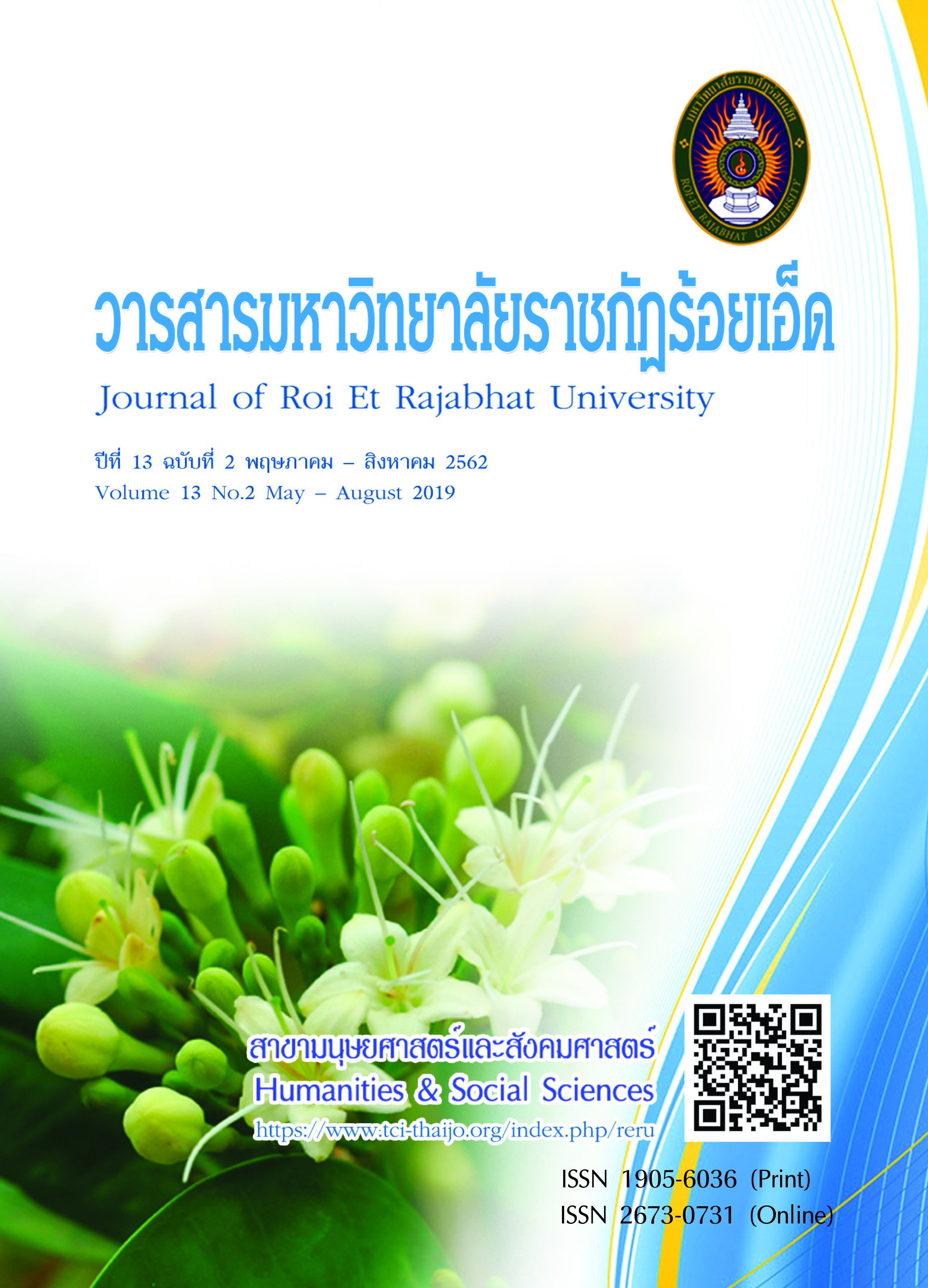The Development of Teachers’ Potential Regarding Learning Management for Enhancing Self-Regulated Leaching: a Case of Khlongkham Witthayakhan School, Kalasin Provincial Administrative Organization
Keywords:
The Development of Teachers’ Potential, Learning Management, Self-Regulated LearningAbstract
The purposes of this study were: 1) to study the context and problems of teachers in teaching; 2) to study the strategies for developing teachers’ potential for enhancing self-regulated leaching; and 3) to study the effects of the development of teachers’ potential. The samples were 19 teachers at Khlongkham Witthayakhan School. The research instruments were: a meeting record form, a document analysis form, the strategies for developing teachers’ potential for enhancing self-regulated leaching, the evaluation form of the strategies for developing teachers’ potential, tests, an evaluation form of designing and writing lesson plans. The data were analyzed through the use of percentage, mean, and standard deviation. The results revealed that 1) In terms of the problems of teachers, they had a problem of designing and writing lesson plans and designing the measurement and evaluation instruments; they focused on lectures; they did not teach according to standards and indicators of the curriculum due to the lack of learning theory and designing and writing lesson plans, and they did not evaluate students learning achievement systematically. 2) The strategies for developing teachers’ potential through the use of teachers’ potential development curriculum consisting of: 1) introduction and significance of curriculum; 2) the purposes of the curriculum; 3) the elements of the curriculum; 4) the procedures of the curriculum; 5) the roles of teachers; 6) the supporting system of the administrators; and 7) the curriculum measurement and evaluation methods. 3. The effects of the development of teachers’ potential revealed that all teachers had the knowledge of teaching higher than 80 percent after the training. In general, the teachers had the ability in designing and writing lesson plans at a very good level.
References
โรงเรียนคลองขามวิทยาคาร. (2558). รายงานการพัฒนาคุณภาพการศึกษา (SAR) ประจำปีการศึกษา 2558. กาฬสินธุ์: อัดสำเนา.
ณรงค์ โสภิณ และคณะ. (2556). การพัฒนายุทธศาสตร์การจัดการเรียนรู้ตามแนวคิดสืบสอบและการรู้คิดเพื่อส่งเสริมการเรียนรู้วิทยาศาสตร์และความสามารถในการกำกับตนเองในการเรียนรู้สำหรับนักเรียนระดับประถมศึกษา. วารสารศึกษาศาสตร์ ฉบับวิจัยบัณฑิตศึกษา มหาวิทยาลัยขอนแก่น, 7(3), 32-41.
พิมพันธ์ เดชะคุปต์. (2553). โมดูล 2 การจัดการเรียนรู้ที่เน้นนักเรียนเป็นศูนย์กลาง ในหลักสูตรฝึกอบรมครูกลุ่มสาระการเรียนรู้วิทยาศาสตร์. เอกสารประกอบการอบรมครูกลุ่มสาระการเรียนรู้วิทยาศาสตร์. ชลพฤกษ์รีสอร์ท จังหวัดนครนายก. 7-21.
ภัทราภรณ์ สังข์ทอง. (2550). พัฒนาการของการเรียนรู้โดยการกํากับตนเองของนักเรียนช่วงชั้นที่ 2 ที่มีการรับรู้ความสามารถของตนเองต่างกัน สังกัดสํานักงานเขตพื้นที่การศึกษานนทบุรี เขต 1. วิทยานิพนธ์ การศึกษามหาบัณฑิต สาขาวิชาการวิจัยและสถิติทางการศึกษา. กรุงเทพฯ: มหาวิทยาลัยศรีนครินทรวิโรฒ.
วิจารณ์ พานิช. (2555). วิถีสร้างการเรียนรู้เพื่อศิษย์ในศตวรรษที่ 21. กรุงเทพฯ: มูลนิธิสดศรี- สฤษดิ์วงศ์.
วิโรจน์ สารรัตนะ. (2554). การวิจัยทางการบริหารการศึกษาแนวคิดและกรณีศึกษา. กรุงเทพฯ: อักษราพิพัฒน์.
วีณา ประชากูล และประสาท เนืองเฉลิม. (2554). รูปแบบการเรียนการสอน (พิมพ์ครั้งที่ 2). มหาสารคาม: มหาวิทยาลัยมหาสารคาม.
สุระพรรณ พนมฤทธิ์, ศุกร์ใจ เจริญสุข และนันทิกา อนันต์ชัยพัทธนา. (2554). การเรียนรู้โดยการกำกับตนเองของนักศึกษาพยาบาลที่มีการรับรู้ความสามารถของตนเองแตกต่างกัน. วารสารการพยาบาลและการศึกษา, 4(2), 94-107.
Bandura, A. (1994). Self-efficacy: The exercise of control. USA: W.H. Freeman and Company.
Chukwudi, E. K. & Okoro, C. O. (2011). Metacognition stratigies : Aviable tools for self-directed Learning. Journal of educational and social research, 1(4), 71-76.
Jones, M. E., Antonenko, P. D. & Greenwood, C. M. (2012). The impact of collaborative and individualized student response system strategies on learner motivation, metacognition, and knowledge transfer. Journal of Computer Assisted Learning, 487.
Kemmis, S., & McTaggart , R. (1992). The Action Research Planner. Victoria : Deakin University Press.
Perry, N. E., Phillips, L. & Hutchinson, L. M.. (2006). Student teachers to support self - regulated learning. Elementary School Journal, 106(3), 237–254.
Schraw, G., Crippen K. J., & Hartley, K. (2006). Promoting Self-Regulation in Science Education: Metacognition as part of a broader Perspective on Learning. Research on Science
Education, 36, 111-119.
Turan S. & Demirel O. (2010). The relationship between self-regulated learning skill and achievement :Acase from Hacettepe university medical school. H. U. Journal of Education, 38(2), 279-291.
Winne, Philip H. (1997). Experimenting to Bootstrap Self-Regulated Learning. Journal of Educational Psychology, 89(3), 397-410.
Zimmerman, B.J. & D.H. Schunk. (2011). Self-Regulated Learning and Performance An Introduction and Overview,” in Handbook of Self-Regulated Learning And Performance.
Edited by B.J. Zimmerman and D.H. Schunk. New York :Taylor & Francis.
Downloads
Published
How to Cite
Issue
Section
License
บทความที่ได้รับการตีพิมพ์เป็นลิขสิทธิ์ของวารสารมหาวิทยาลัยราชภัฎร้อยเอ็ด
ข้อความที่ปรากฏในบทความแต่ละเรื่องในวารสารวิชาการเล่มนี้เป็นความคิดเห็นส่วนตัวของผู้เขียนแต่ละท่านไม่เกี่ยวข้องกับมหาวิทยาลัยราชภัฎร้อยเอ็ด และคณาจารย์ท่านอื่นๆในมหาวิทยาลัยฯ แต่อย่างใด ความรับผิดชอบองค์ประกอบทั้งหมดของบทความแต่ละเรื่องเป็นของผู้เขียนแต่ละท่าน หากมีความผิดพลาดใดๆ ผู้เขียนแต่ละท่านจะรับผิดชอบบทความของตนเองแต่ผู้เดียว



